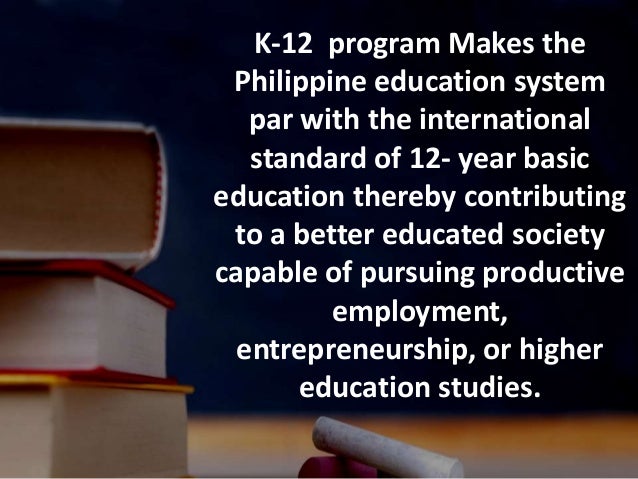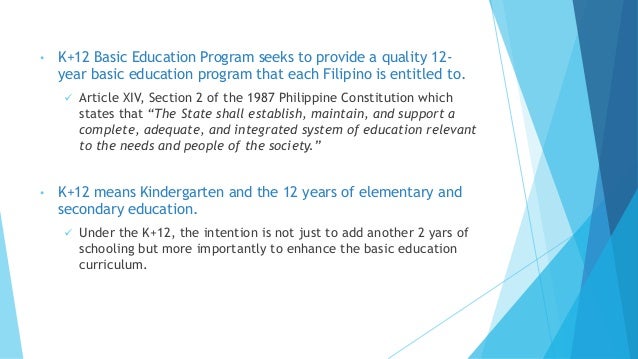The Enhanced K To 12 Basic Education Program
WHAT IS K-12 PROGRAM?
The K to 12 Program covers Kindergarten and 12 years of basic education (six years of primary education, four years of Junior High School, and two years of Senior High School [SHS]) to provide sufficient time for mastery of concepts and skills, develop lifelong learners, and prepare graduates for tertiary education, middle-level skills development, employment, and entrepreneurship.
WHY K-12 ?
Enhancing the quality of basic education in the Philippines is urgent and critical. Why?
The Enhanced K+12 Basic Education Program Rationale
- The Enhanced K+12 Basic Education Program seeks to provide for a quality 12-year basic education program that each Filipino is entitled to. This is consistent with Article XIV, Section 2(1) of the 1987 Philippine Constitution which states that “The State shall establish, maintain, and support a complete, adequate, and integrated system of.
- January 15, 2021 DO 003, s. 2021 – Creation of the Child Protection Unit and the Child Rights in Education Desk in the Department of Education January 4, 2021 DO 001, s. 2021 – Guidelines on the Evaluation of Self-Learning Modules for Quarters 3 and 4 for School Year 2020-2021.
- Subsequently, Republic Act 10533 also known as the 'Enhanced Basic Education Act of 2013' enabled the implementation of the K-12 in the country (The Official Gazette,2013).The Philippine K-12 curricular program provides at least one year of Kindergarten education and a total of twelve years of basic education similar with most of the countries.
Poor quality of basic education is reflected in the low achievement scores of Filipino students in the National Achievement Test and international tests like TIMSS (Trends In Math and Science Subject); partly due to the congested curriculum; The current 10-year basic education curriculum is designed to be taught in 12 years.
EDUCATION VISION 14 Every graduate of the Enhanced K+12 Basic Education Program is an empowered individual who has learned, through a program that is rooted on sound educational principles.
- Our high school graduates are: > not adequately prepared for the world of work (most of the basic education graduates are too young to legally enter the labor force (legal age would be 18)
- not adequately prepared to pursue higher education; or if prepared; end up shifting courses
The 10-year basic education cycle hinders the recognition of Filipino professionals abroad.
- The Washington Accord prescribes 12-years of basic education as an entry to recognition of engineering professionals.
- The Bologna Process also requires 12 years of education for university admission and practice of profession in European countries.
The Philippines is the only country in Asia and among the three remaining countries in the world that has a10-year basic education cycle.
ASEAN Integration 2015 (Philippines, Brunei, Cambodia, Indonesia, Laos, Malaysia, Myanmar, Singapore, Thailand, and Vietnam)
- wider door for job markets HOWEVER competition will be tougher
- schools and universities have to compete with the world as “global athletes” not just “barangay warriors”
- DepED, CHED, TESDA and DOLE should see to it that the academic curriculum and technical skills would fit competition in the world market
The K to12 is Already a Law. REPUBLIC ACT 10533 “Enhanced Basic Education Act of 2013”
 Salient Points on the Enhanced K to 12 Basic Education Program
Salient Points on the Enhanced K to 12 Basic Education ProgramWhat is K to 12?
The Enhanced K To 12 Basic Education Programme

- K to 12 means Kindergarten and the 12 years of elementary and secondary education.
Kindergarten refers to the 5-year old cohort that takes a standardized kinder curriculum.
Elementary education refers to primary schooling that involves six or seven years of education
Secondary education refers to high school.How are we planning to implement the K to 12 program?
After considering various proposals and studies, the model that is currently being proposed by DepEd is the
 K-6-4-2 Model. This model involves Kindergarten, six years of elementary education, four years of junior high school (Grades 7 to 10) and two years of senior high school (Grades 11 to 12). The two years of senior high school intend to provide time for students to consolidate acquired academic skills and competencies.
K-6-4-2 Model. This model involves Kindergarten, six years of elementary education, four years of junior high school (Grades 7 to 10) and two years of senior high school (Grades 11 to 12). The two years of senior high school intend to provide time for students to consolidate acquired academic skills and competencies.
Features of K 6-4-2
(1) Kindergarten and 12 years of quality basic education is a right of every Filipino, therefore they must be and will be provided by government and will be free.
(2) Those who go through the 12 years cycle will get an elementary diploma (6 years), a junior high school diploma (4 years), and a senior high school diploma (2 years).
(3) A full 12 years of basic education will eventually be required for entry into tertiary level education (entering freshmen by SY 2018-2019 or seven years from now).
- An open and consultative process will be adopted in the development and implementation of K to 12.
- Change is two-fold: (a) curriculum enhancement and (b) transition management.
Discussion Paper On The Enhanced K+12 Basic Education Program
What is Senior High School?
- 2 years of in-depth specialization for students depending on the occupation/career track they wish to pursue
- Skills and competencies relevant to the job market
- The 2 years of senior HS intend to provide time for students to consolidate acquired academic skills and competencies.
- The curriculum will allow specializations in Science and Technology, Music and Arts, Agriculture and Fisheries, Sports, Business and Entrepreneurship.
What is the proposed implementation plan of DepEd?
Phases of Implementation:
(1) Universal kindergarten will be offered starting SY 2011-2012.
(2) DepEd will begin unclogging the basic education curriculum in SY 2012-2013.
(3) The enhanced 12-year curriculum will be implemented starting with incoming Grade 1 students of SY 2012-2013.
(4) Incoming freshmen of SY 2012-2013 will be the first beneficiary of a free Senior High School education that will be made available by DepEd in public schools beginning SY 2016-2017. Electives to be offered in Senior HS (arts, music, tech-voch..etc)

In implementing the K-6-4-2 proposal, DepEd will take into account the issues and concerns of all stakeholders, including the high school graduates before 2016. This will be done through regional consultations to begin early 2011. The mechanics and other details of the transition plan will be threshed out with HEIs in coordination with CHED, TESDA and other critical stakeholders.
Why add two more years?
- To decongest and enhance the basic education curriculum
- To provide better quality education for all
- The Philippines is the only remaining country in Asia with a 10-year basic education program
- K to 12 is not new. The proposal to expand the basic education dates back to 1925.
- Studies in the Philippines have shown that an additional year of schooling increases earnings by 7.5%.
- Studies validate that improvements in the quality of education will increase GDP growth by 2% to 2.2%.
- Minus 2 instead of plus 2 for those families who cannot afford a college education but still wish to have their children find a good paying job. Right now, parents spend for at least 4 years of college to have an employable child. In our model, parents will not pay for 2 years of basic education that will give them an employable child. In effect, we are saving parents 2 years of expenses. The plan is not “Plus 2 years before graduation” but “Minus 2 years before work
- To inspire a shift in attitude that completion of high school education is more than just preparation for college but can be sufficient for a gainful employment or career.
How much will this cost?
- The immediate cost for the program will not be needed until 2016 when the first year of the two additional years is implemented.
- Meanwhile, we will continue to close the resource gaps in basic education – the President ordered DepEd to its close resource gaps in 2 years.
152,569 new classrooms
103,599 more teachers
95.6 million more books
The Enhanced K To 12 Basic Education Programs
13.2 million seatsWhat will society gain from K to 12
- K to 12 will facilitate an accelerated economic growth.
- K to 12 will facilitate mutual recognition of Filipino graduates and professionals in other countries.
- A better educated society provides a sound foundation for long-term socio-economic development.
- Several studies have shown that the improvements in the quality of education will increase GDP growth by as much as 2%. Studies in the UK, India and US show that additional years of schooling also have positive overall impact on society.
- While we enjoy the support of private school associations, we are yet to discuss with them the implementation of the program.
- Insufficient mastery of basic competencies is common due to a congested curriculum. The 12 year curriculum is being delivered in 10 years.
- High school graduates are younger than 18 years old and lack basic competencies and maturity. They cannot legally enter into contracts and are not emotionally mature for entrepreneurship / employment.
- Other countries view the 10-year education cycle as insufficient.
Graduates of Enhanced K to 12 Basic Education Program will:
- Acquire mastery of basic competencies.
- Be more emotionally mature.
- Be socially aware, pro-active, involved in public and civic affairs.
- Be adequately prepared for the world of work or entrepreneurship or higher education.
- Be legally employable with potential for better earnings.
- Be globally competitive.
- Every graduate of the Enhanced K to 12 Basic Education Program is an empowered individual who has learned, through a program that is rooted on sound educational principles and geared towards excellence, the foundations for learning throughout life, the competence to engage in work and be productive, the ability to coexist in fruitful harmony with local and global communities, the capability to engage in autonomous critical thinking, and the capacity to transform others and one’s self.
The Enhanced K+12 Basic Education Program
sDeped Enhanced K+12 Basic Education Program
